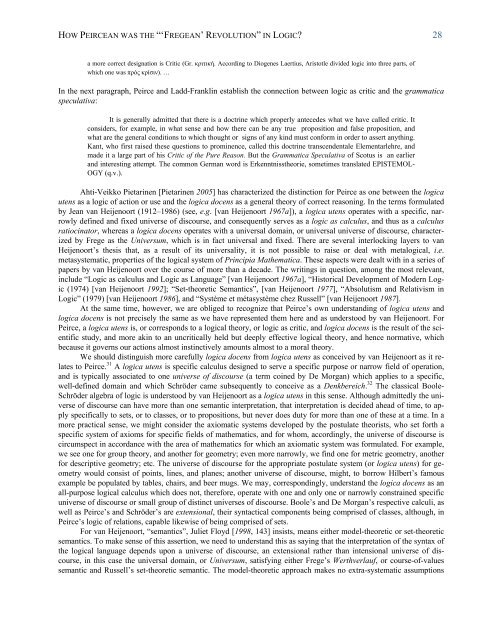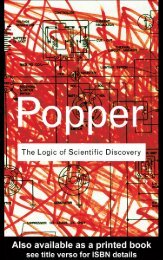You also want an ePaper? Increase the reach of your titles
YUMPU automatically turns print PDFs into web optimized ePapers that Google loves.
HOW PEIRCEAN WAS THE “‘FREGEAN’ REVOLUTION” IN LOGIC? 28<br />
a more correct designation is Critic (Gr. κριτική. According to Diogenes Laertius, Aristotle divided logic into three parts, of<br />
which one was πρòς κρíσιν). …<br />
In the next paragraph, Peirce and Ladd-Franklin establish the connection between logic as critic and the grammatica<br />
speculativa:<br />
It is generally admitted that there is a doctrine which properly antecedes what we have called critic. It<br />
considers, for example, in what sense and how there can be any true proposition and false proposition, and<br />
what are the general conditions to which thought or signs of any kind must conform in order to assert anything.<br />
Kant, who first raised these questions to prominence, called this doctrine transcendentale Elementarlehre, and<br />
made it a large part of his Critic of the Pure Reason. But the Grammatica Speculativa of Scotus is an earlier<br />
and interesting attempt. The common German word is Erkenntnisstheorie, sometimes translated EPISTEMOL-<br />
OGY (q.v.).<br />
Ahti-Veikko Pietarinen [Pietarinen 2005] has characterized the distinction for Peirce as one between the logica<br />
utens as a logic of action or use and the logica docens as a general theory of correct reasoning. In the terms formulated<br />
by Jean van Heijenoort (1912–1986) (see, e.g. [van Heijenoort 1967a]), a logica utens operates with a specific, narrowly<br />
defined and fixed universe of discourse, and consequently serves as a logic as calculus, and thus as a calculus<br />
ratiocinator, whereas a logica docens operates with a universal domain, or universal universe of discourse, characterized<br />
by Frege as the Universum, which is in fact universal and fixed. There are several interlocking layers to van<br />
Heijenoort’s thesis that, as a result of its universality, it is not possible to raise or deal with metalogical, i.e.<br />
metasystematic, properties of the logical system of Principia Mathematica. These aspects were dealt with in a series of<br />
papers by van Heijenoort over the course of more than a decade. The writings in question, among the most relevant,<br />
include “Logic as calculus and Logic as Language” [van Heijenoort 1967a], “Historical Development of Modern Logic<br />
(1974) [van Heijenoort 1992]; “Set-theoretic Semantics”, [van Heijenoort 1977], “Absolutism and Relativism in<br />
Logic” (1979) [van Heijenoort 1986], and “Système et métasystème chez Russell” [van Heijenoort 1987].<br />
At the same time, however, we are obliged to recognize that Peirce’s own understanding of logica utens and<br />
logica docens is not precisely the same as we have represented them here and as understood by van Heijenoort. For<br />
Peirce, a logica utens is, or corresponds to a logical theory, or logic as critic, and logica docens is the result of the scientific<br />
study, and more akin to an uncritically held but deeply effective logical theory, and hence normative, which<br />
because it governs our actions almost instinctively amounts almost to a moral theory.<br />
We should distinguish more carefully logica docens from logica utens as conceived by van Heijenoort as it relates<br />
to Peirce. 31 A logica utens is specific calculus designed to serve a specific purpose or narrow field of operation,<br />
and is typically associated to one universe of discourse (a term coined by De Morgan) which applies to a specific,<br />
well-defined domain and which Schröder came subsequently to conceive as a Denkbereich. 32 The classical Boole-<br />
Schröder algebra of logic is understood by van Heijenoort as a logica utens in this sense. Although admittedly the universe<br />
of discourse can have more than one semantic interpretation, that interpretation is decided ahead of time, to apply<br />
specifically to sets, or to classes, or to propositions, but never does duty for more than one of these at a time. In a<br />
more practical sense, we might consider the axiomatic systems developed by the postulate theorists, who set forth a<br />
specific system of axioms for specific fields of mathematics, and for whom, accordingly, the universe of discourse is<br />
circumspect in accordance with the area of mathematics for which an axiomatic system was formulated. For example,<br />
we see one for group theory, and another for geometry; even more narrowly, we find one for metric geometry, another<br />
for descriptive geometry; etc. The universe of discourse for the appropriate postulate system (or logica utens) for geometry<br />
would consist of points, lines, and planes; another universe of discourse, might, to borrow Hilbert’s famous<br />
example be populated by tables, chairs, and beer mugs. We may, correspondingly, understand the logica docens as an<br />
all-purpose logical calculus which does not, therefore, operate with one and only one or narrowly constrained specific<br />
universe of discourse or small group of distinct universes of discourse. Boole’s and De Morgan’s respective calculi, as<br />
well as Peirce’s and Schröder’s are extensional, their syntactical components being comprised of classes, although, in<br />
Peirce’s logic of relations, capable likewise of being comprised of sets.<br />
For van Heijenoort, “semantics”, Juliet Floyd [1998, 143] insists, means either model-theoretic or set-theoretic<br />
semantics. To make sense of this assertion, we need to understand this as saying that the interpretation of the syntax of<br />
the logical language depends upon a universe of discourse, an extensional rather than intensional universe of discourse,<br />
in this case the universal domain, or Universum, satisfying either Frege’s Werthverlauf, or course-of-values<br />
semantic and Russell’s set-theoretic semantic. The model-theoretic approach makes no extra-systematic assumptions





